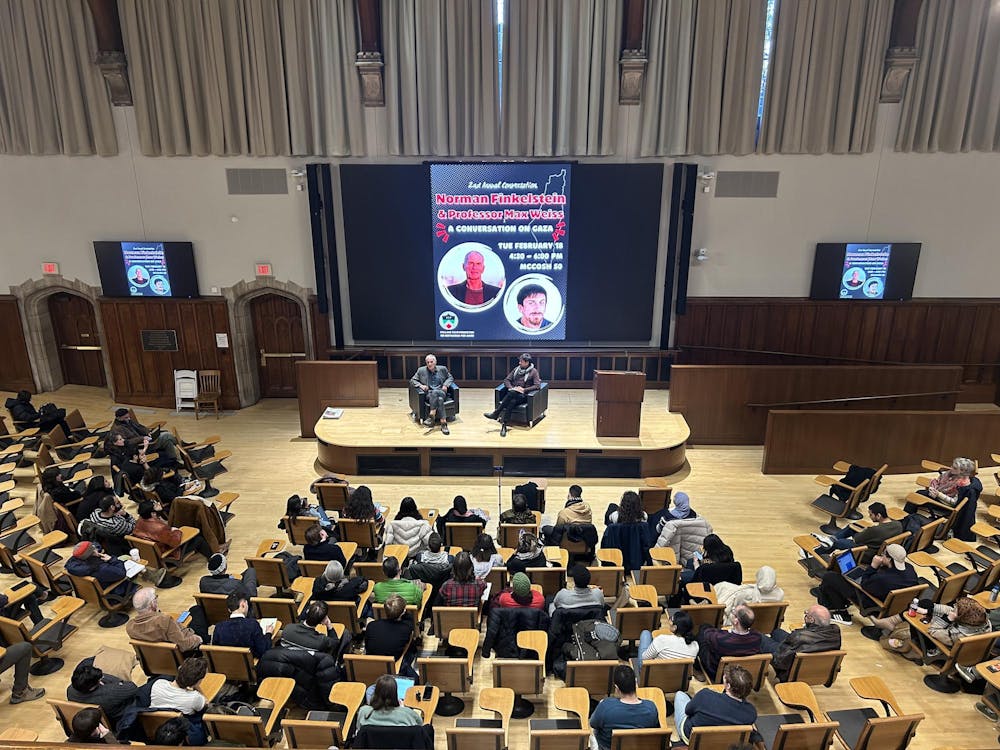Political scientist and activist Norman Finkelstein GS ’87 returned to campus on Tuesday to discuss the war in Gaza with history professor Max Weiss. Throughout the talk, Finkelstein addressed the United States’ history with the Middle East from the early 2000s, the United Nations’ complicated history with the Israel-Palestine conflict, and the war in Gaza.
Finkelstein previously spoke on campus in March 2024, touching on similar themes and drawing a crowd of nearly 300. Tuesday’s event, billed as a ”second annual” conversation, was noticeably smaller, with about 75 to 100 people sitting interspersed throughout McCosh 50. In 2019, Finkelstein drew controversy at a campus event for invoking an antisemitic trope and having a contentious exchange with a student who had served in the Israeli Defense Forces.
The talk is the second in a series of events this week hosted by Princeton Students for Justice in Palestine (SJP) for their Israeli Apartheid Week. Weiss began by asking Finkelstein to provide some current context for the situation in the Middle East.
Running through a history of Israeli ceasefires, Finkelstein argued that Israel’s actions in Gaza constituted genocide, citing a 750 page document that South Africa presented to the International Court of Justice (ICJ) on Oct. 28, 2023.
“If you’re systematically, methodically, consciously, willfully depriving the population of water and food, you’re now squarely in the terrain of genocide,” Finkelstein said.
Referencing Daniel Goldhagen’s book “Hitler’s Willing Executioners,” Finkelstein then compared the actions of the Israeli government with the actions of the Third Reich. Finkelstein is the son of Holocaust survivors.
“I think the Israelis are in a very different category, a much more egregious category,” Finkelstein said. “Maybe it’s better or worse. I’m not going to pass judgment, but the kind of sadism that’s so brazenly executed by the Israelis in Gaza is not even in the Nazi category.”
Finkelstein then addressed whether reconciliation between Israel and Gaza was possible.
“I’m willing to stake somebody’s life on it: there’s no possibility whatsoever that [Israel is] going to allow for the reconstruction of Gaza because … their whole goal was to make it unlivable.”
As he began the Q&A section, Finkelstein first addressed a few students sitting in the back of the audience.
“I saw some respectful but disgruntled students in that corner, and I always believe that those who disagree — so long as they’re respectful — they get the first question or questions, so the floor is yours,” Finkelstein said.
Raphael Delgado ’28 was the first to speak, questioning Finkelstein about data that he had cited on the number of buildings in Gaza that had been destroyed.

“The number comes from the Palestinian government, essentially, so I was wondering, when we make claims, to what extent we can trust the sourcing that they come from,” Delgado said.
Finkelstein answered by expressing his belief that the government of Gaza was “exaggerating” the number of deaths in Gaza by ”41 percent less” than reality, citing a study published in The Lancet that estimated that the Palestinian Ministry of Health under-reported mortality by 41 percent.
Noura Shoukfeh ’25, a member of SJP, told the ‘Prince’ that she believed the event “went well.”
“It was a wonderful opportunity to hear Norman Finkelstein, with all of his scholarship and wealth of knowledge on the subject of Palestine and Israel,” Shoukfeh said. “I think it was a great opportunity for Princeton students to learn about what is happening currently in Palestine from a very reputable scholar.”
Luke Grippo is a staff News writer for the ‘Prince.’ He is from South Jersey and usually covers administrative issues, including USG, the CPUC, and institutional legacy.
Please send corrections to corrections[at]dailyprincetonian.com.








